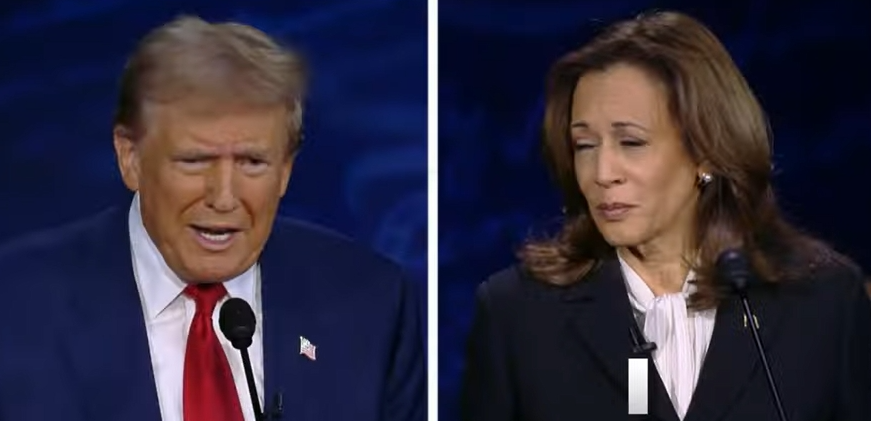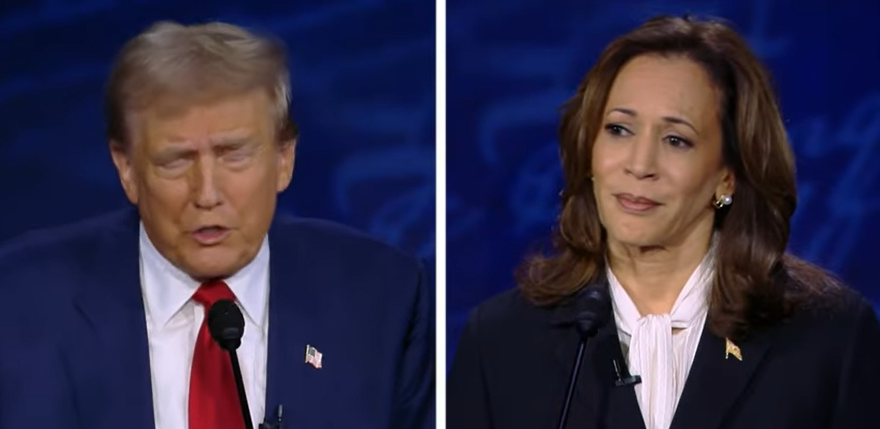The highly anticipated presidential debate between Vice President Kamala Harris and former President Donald Trump was, by any measure, a dramatic success. The ABC-hosted event showcased not only the stark political and ideological differences between the two candidates but also their contrasting debate strategies. This face-off, which focused on crucial issues like criminal justice, immigration, and the nature of political engagement, gave the public a clear picture of their leadership styles and political visions for the future of the United States.
Here are the key takeaways from the Harris vs. Trump debate:

Harris’s Strategic Baiting: A Prosecutorial Approach
Kamala Harris, known for her prosecutorial background, demonstrated her legal prowess by using a highly strategic approach during the debate. She baited Trump on multiple issues, successfully eliciting emotional responses from him. One of the most notable moments came when Harris mentioned Trump’s criminal conviction and his outstanding legal issues. The reference to Trump’s multiple legal battles, including his indictment on criminal charges, immediately struck a nerve. True to his past debate performances, Trump reacted defensively, which allowed Harris to maintain control of the discussion. Harris’s approach mirrored a trial lawyer cross-examining a witness, using pointed questions and well-timed jabs to keep Trump on the defensive. Her tactic of bringing up his legal troubles was particularly effective, as it forced Trump to confront an issue that has loomed over his political career since his dismissal from the White House.
Immigration: A Contentious Battleground
Immigration, long a central theme in Trump’s political platform, became another flashpoint during the debate. Harris strategically highlighted Trump’s failure to advance meaningful immigration reform, especially his role in sinking a bipartisan immigration bill during his presidency. By framing the conversation around the lack of progress under Trump’s leadership, Harris further emphasized the challenges the nation has faced regarding immigration reform and border security. Trump, in response, defended his tough immigration stance, reiterating his administration’s policy of building a wall along the U.S.-Mexico border and enforcing stricter immigration laws. However, Harris used his reactive stance to showcase her commitment to humane and comprehensive immigration reform, offering a contrast to Trump’s hardline policies. Trump’s emotional response to this issue reinforced Harris’s ability to steer the conversation while keeping him on the back foot.

Trump’s Rally Style vs. Harris’s Focus on Policy Substance
Another key moment came when Harris suggested that Trump’s political rallies had become “boring,” a comment that struck a personal chord with Trump, who takes pride in the energy and enthusiasm of his supporters at these events. Trump’s rallies have always been a central part of his brand, providing a platform to galvanize his base and stir media attention. By dismissing them as unengaging, Harris not only poked fun at Trump’s signature campaign tactic but also questioned its effectiveness in addressing the serious policy concerns facing the nation. Trump’s response was swift and defensive, illustrating how deeply personal the criticism of his rallies felt. His reaction detracted from a focus on substantive policy debates, instead drawing attention to his need for validation through public displays of support. This dynamic played into Harris’s hands, allowing her to maintain the high ground by focusing on the policy issues at stake, such as the economy, healthcare, and climate change, which Trump largely avoided in his responses.

The Issue of Legal Accountability
Harris’s mention of Trump’s criminal convictions was more than just a political jab; it highlighted a fundamental issue of legal accountability. Trump’s legal troubles, including his indictment for business fraud and other charges, have cast a long shadow over his political ambitions. Harris skillfully brought these issues to the forefront, framing them as not only a personal problem for Trump but as emblematic of a larger crisis of political accountability. Trump’s reaction to these references was telling. Rather than deflecting or pivoting to other policy issues, Trump became visibly defensive, focusing on denying the allegations rather than addressing policy questions. This provided Harris with the opportunity to emphasize the need for leaders who are transparent and accountable to the public, reinforcing her narrative of being a steady and trustworthy alternative to Trump’s more erratic style of leadership.
Policy vs. Personality
The debate further revealed the contrast between Harris’s policy-driven approach and Trump’s personality-driven style. Throughout the debate, Harris focused on substantive policy issues, such as economic recovery, healthcare reform, climate action, and social justice. She highlighted the Biden administration’s efforts in these areas and laid out her vision for expanding those policies to further benefit the American people. Trump, on the other hand, leaned heavily into his personal appeal and connection with his voter base. Rather than delving into detailed policy proposals, Trump used emotional appeals, emphasizing his “America First” agenda and presenting himself as the only candidate capable of restoring order and prosperity. His rhetorical approach played well to his base but lacked the depth and detail that many undecided voters or policy-oriented viewers might have been looking for.

The Future of American Leadership
At its core, the Harris vs. Trump debate was a referendum on the future direction of the United States. Harris framed her candidacy as a continuation of the Biden administration’s efforts to promote inclusivity, fairness, and progressive reforms. She championed policies aimed at reducing inequality, expanding healthcare access, and combating climate change. In contrast, Trump presented himself as the outsider, determined to dismantle the “establishment” and restore the pre-COVID economy, largely by cutting taxes and rolling back government regulations. The debate underscored a fundamental choice for the American electorate: a forward-looking vision centered on progressive reforms and inclusivity, or a return to Trump’s populist, nationalist platform. Harris’s focus on policy substance, combined with her ability to control the narrative through strategic baiting, gave her the upper hand in the debate, particularly in the eyes of voters looking for a clear, substantive discussion of the issues.
Conclusion: A Debate That Set the Stage for the Election
The Harris vs. Trump debate will be remembered as a defining moment in the 2024 presidential race. Kamala Harris’s tactical approach, combined with her emphasis on policy and accountability, contrasted sharply with Donald Trump’s more personality-driven performance. By baiting Trump on critical issues like immigration, criminal justice, and his political rallies, Harris demonstrated her ability to keep her opponent on the defensive while advancing her Top vision for the country. Ultimately, the debate set the stage for a broader discussion about the future of American leadership and governance, offering voters a clear choice between two very different approaches to politics and policy. — This article explores the dynamics and key takeaways from the Harris vs. Trump debate, analyzing their contrasting debate styles, key policy issues, and the implications for the 2024 election.

Written By Donte T. Nelson
Staff Writer
The Neoliberal Post The Neoliberal Journals
Edited and Published by Renaldo McKenzie, Content Chief/President
Check out our Podcast The Neoliberal Round Podcast

NEOLIBERALISM BOOK 1 PAPERBACK AND HARDCOVER IS ON SALE.



